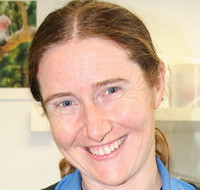In 2013 Dr Fiona McBryde was lured back to New Zealand from her postdoctoral position at the University of Bristol in the UK after receiving the HRC’s prestigious $500,000 Sir Charles Hercus Research Fellowship. Now the University of Auckland Research Fellow is about to lead her first HRC project having just secured more than $1 million in the latest HRC funding round.
Dr McBryde completed her PhD in physiology at the University of Auckland under the supervision of Professor Simon Malpas, himself a past and current HRC project recipient. She then spent five years at the University of Bristol developing the ‘selfish brain’ model of hypertension. This model explores how the brain may be causing and controlling blood pressure increases to maintain its own supply of blood and oxygen.
“We’ve known for many years that the blood vessels supplying the brains of people with high blood pressure show signs of wall thickening. It’s been assumed that this occurs in response to high blood pressure, to protect the brain from high levels of arterial pressure. We are investigating the novel possibility that impaired brain blood flow occurs early, and may in fact be a primary trigger for high blood pressure,” says Dr McBryde.
The role of the selfish brain in regulating blood pressure is also the focus of Dr McBryde’s Sir Charles Hercus fellowship.
“The Sir Charles Hercus fellowship brought me back from Bristol and gave me the freedom to develop my new research directions. I’m still focusing on the selfish brain, but this time I’m looking at whether elevated cerebrovascular resistance in the brainstem causes high blood pressure,” says Dr McBryde.
As part of this research Dr McBryde and her collaborators in New Zealand and the UK have developed advanced techniques to enable them to make long-term recordings of blood pressure, sympathetic nerve activity, and brain oxygen levels simultaneously. Although it’s still early days, Dr McBryde says their experiments to date show that restricting the blood supply to the brain can cause a very rapid increase in blood pressure. Some of their findings are also challenging long-held beliefs.
“We’ve been studying Cushing’s mechanism, a reflex where people experience a very sudden rise in blood pressure and heart rate irregularities caused by increased pressure inside the skull. It’s long been viewed as the brain’s last-ditch response to protect itself in an emergency situation, such as a brain hemorrhage. However, our experiments suggest that this response might actually be a system that’s operating to regulate blood pressure on a day-to-day basis.”
Dr McBryde’s recently awarded HRC project contract will make use of some of her Hercus study findings to determine if the dramatic spike in blood pressure observed following a stroke – an increase of about 40 mmHg – is a good thing or a bad thing.
“Clinical guidelines in New Zealand, the UK and USA currently state that you shouldn’t generally intervene to lower a patient’s blood pressure following a stroke unless their systolic blood pressure is over 180 mmHg, which is quite high [normal systolic pressure is about 120 mmHg].”
Dr McBryde says this approach is based entirely on intuitive medicine.
“We assume that this increase in blood pressure is happening to try to increase blood flow to the damaged tissues in the brain, however, there’s no good evidence to say if this approach is causing more harm or not.”
Although her HRC project doesn’t officially start until November, Dr McBryde and her team have already got experiments running in rats, with some exciting results starting to come through. She’s confident their work will be able to answer once and for all if preventing high blood pressure post-stroke is clinically beneficial or not.
“I don’t know which way it will go – I’m hedging my bets a bit. If we can prevent this rise in blood pressure after a stroke, we can measure what the direct effects are on the pressure inside the skull and blood flow to the brain. This is a really powerful tool to let us evaluate the safety of blood pressure control after stroke.”
HRC Chief Executive Professor Kath McPherson says the Sir Charles Hercus fellowship has assisted many outstanding researchers to develop their research careers.
“Fiona’s career progression is an outstanding example of the critical role the HRC can play in creating attractive career paths for our researchers and helping build New Zealand’s future capability to conduct world-class research,” says Professor McPherson
Dr Fiona McBryde was awarded the HRC’s premier career development award, the Sir Charles Hercus Research Fellowship ($500,000 over four years) in 2013, followed by a HRC project grant ($1,055,738) in 2015 for her study ‘Hypertension after stroke – therapeutic or pathological?’. For more information about these awards go to www.hrc.govt.nz/funding-opportunities.
